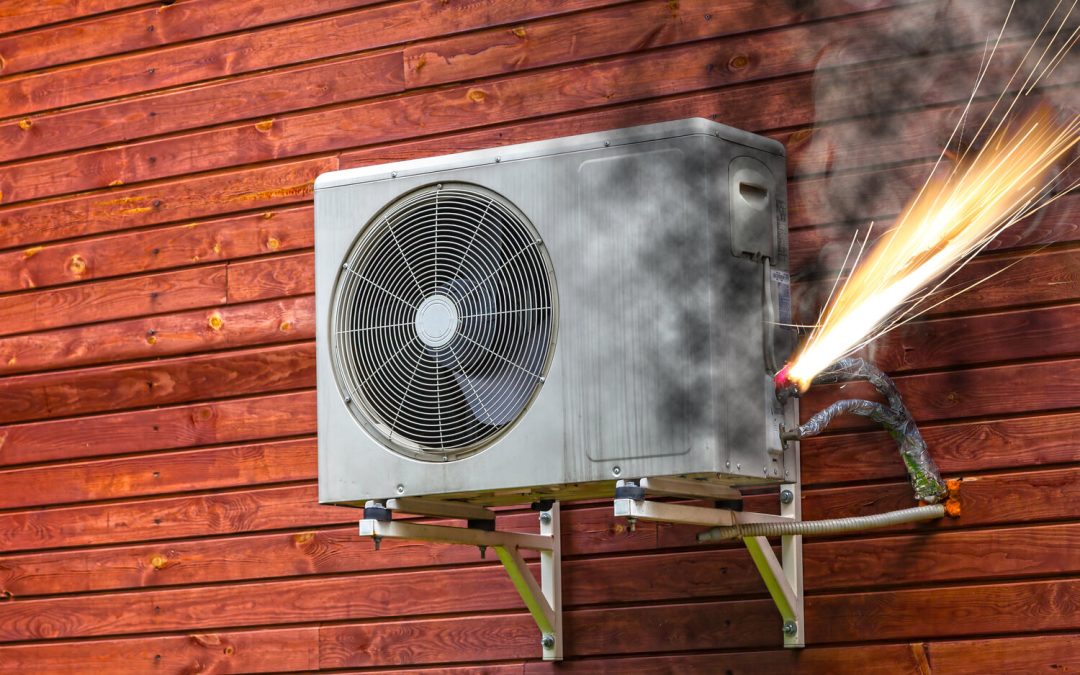1. High Voltage and Short Circuit:
Compressor issues can be caused by high voltage and short circuits, which can occur if there is a spike in electricity usage in your home. The device could overheat, which could cause an electrical short. Call for HVAC services immediately if your outside unit won’t turn on and continuously trips the circuit breaker.
Although compressor short circuits are unusual, they do occur. If you smell something burning coming from the direction of the air conditioner, you may have detected a problem. It’s possible that the stench you’re picking up comes from an overheated compressor or charred wires.
2. Poor Insulation:
Insulation issues are not uncommon in older apartments, particularly those that are always subjected to bright sunshine. These flats also tend to have problems with condensation. Without the appropriate insulation, the compressor can overheat and stop working. When exposed to extreme temperatures, the compressor stops working.
3. High-End Pressure:
When dirt and debris build up in the vents of the outer unit of an air conditioner, the head pressure might increase. Overheating can occur in your compressor if the cooling system is unable to release the hot air produced by the unit due to high head pressure caused by dirty coils.
Overheated compressors can also contribute to high head pressure if a nearby heat pump is warming the unit. Overheating can also be caused by the environment, especially in the summer. However, a filthy coil is the most prevalent cause of high pressure.
4. Lack of Adequate Cooler Space:
If the air compressors are in a warm region, the unit may have trouble cooling the air that comes into the appropriate levels. If the machine is in a poorly ventilated room, for instance, the internal processes will be affected by the room’s heat, leading to more warm, more inefficient airflow at the end-points of various pneumatic operations. Condensation and moisture buildup inside the compressor as a result of its environment’s high temperature can also have an adverse effect on its ability to do its job.
5. Inadequate Air Conditioner Size:
The efficiency of cooling capacity is the primary difference between different types of air conditioners. As a rule of thumb, the bigger the area that needs to be cooled, the more powerful the cooling system must be. If the air conditioner is too tiny or weak to properly chill the space, the system will have to work more to achieve the target temperature. Because of this, the compressor will overheat.
6. Low Refrigerant Level:
Low levels of refrigerant might cause the air conditioner’s mechanisms to overheat and cause the system to grind to a halt. Leakage of water, and freezing Air conditioner coils, as well as burnt odors, are all signs of low refrigerant levels.
Leaks in the refrigerant pipelines are a common cause of low refrigerant charge. In this scenario, having professionals inspect the problem and fix the leak would be the best course of action. The leak would be located using neon dye added to the refrigerant, and the technician would immediately repair the leak to prevent any more damage to your unit.
7. Use Frequency:
The amount of use that an air compressor receives will, of course, also likely have an impact on its capacity to perform at optimal temperatures on a continuous basis. This is because the air compressor will experience wear and tear as a result of the amount of use. When an air compressor is allowed to age and is used frequently, it will ultimately reach a point where it will encounter heating problems, which could keep it from operating correctly.
8. Ambient Temperature:
Where do you work and how warm or cold does it generally get there? As a result of temperature increases in specific locations during the past twenty years, conditions that were favorable for air compressors just a generation ago may now require certain adaptations.
If increased temperatures throughout summertime are an outcome of global warming, it may be essential to install more air conditioning in the space that houses your air conditioning unit. This would be necessary in the event that the climate continues to change.
9. Eroded Oil:
Deteriorated oil quality is directly related to blocked pipes in the compressed air systems and hence ranks as problem number nine. Once the oil becomes old and thick, it prevents the internal parts from moving smoothly. Metal surfaces grind against each other and components are stressed as the machine must work harder than usual to maintain its previous level of performance.
Old, thickened oil is a major contributor to the overheating of the system. Oil changes should be done more frequently as part wear increases. A burnt oil odor coming from the air compressor shows that the lubricant has hardened, reducing the compressor’s cooling efficiency. Alternately, the oil’s viscosity could decrease due to the heat, leading to additional issues.
10. Type of Air Compressor:
Which type of air compressor is the best? Not every air compressor is made equal; many are more appropriate for activities that require a higher level of difficulty than others. It is impossible for a single little air compressor to maintain the continuous running of strong pneumatic gear without the compressor finally overheating.
If the compressor is more than 20 years old, it is also possible that it is time to replace it. Consider your current requirements in light of the capabilities offered by your air-compression equipment.
11. Clogged Intel Filter:
If there is a lot of dirt in the inlet filters, the equipment may have to work harder than it should, which, when combined with the warm weather of summer and any of the other conditions stated, may cause the device to overheat or fail. You should change the intake filter cleaner about once every six months (especially if warm weather is on its way), but it’s especially important when the weather becomes warmer.


